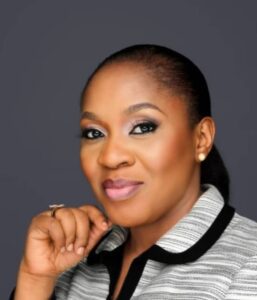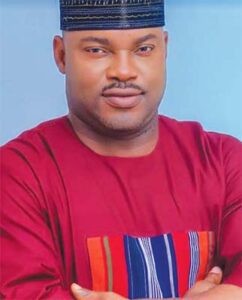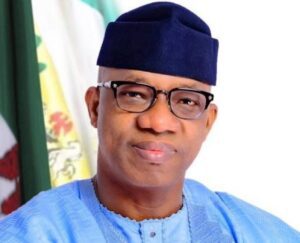Nigeria’s focus on renewable energy is a misplaced priority — UN SDG Executive
HANNAH OSAYANDE BERE is a United Nations SDG Advocate, mental health ambassador, sustainability executive, and advocate for gender inclusion. She was born with a passion for humanity and sustainable growth. In an interview with OMOLOLA DEDE ADEYANJU, she discussed how Nigeria can achieve sustainable economic growth, a balanced level of gender inclusion, and reach the UN’s 2030 agenda for member states.
How did you become a mental health ambassador?
I am a born survivor, I lost my mum and my immediate younger brother in a house fire and that was the biggest house fire ever seen in my community at the time. It happened when I was thirteen years old so I didn’t know how to process it. I was more of frustrated, deppressed, and being from an African home, my dad did what he could do but what I needed at that time was a therapist, a counsellor, I needed someone to talk to but instead it was a case of ‘she will be fine, she is bereaving’.
So growing up I knew I should also help other people battle depression, I started researching on how I can help, what I can do to help people most especially in Africa, in Nigeria. I also remember someone telling me ‘you can actually pass for a mental health ambassador because of the way you talk to people, your level of empathy and your passion’. I was nineteen as at the time, hence I began receiving trainings and certifications. Being a mental health ambassador although started as a passion of mine but overtime it became a career.
Just before I had my first child I got my certificate on mental health training then after the birth of my second child I became a certified ambassador due to the different achievements I got. At this point I delved into focusing on mothers, it was so incredible that the niche became women battling postpartum depression. I became an advocate, an ambassador helping them come out of that and thenceforward different organizations started reaching out to me for public speaking and consultancy.
Being a mental health ambassador has helped me in my career in terms of sustainability, as we know ESG, the S stands for Social. My approach, feedback is based on empathy, getting to hear people’s stories and seeing ways to help them out.
What are your achievements as a mental health ambassador so far?
As little as a smile on a child’s face is, it’s a great achievement for me. A smile that comes from something positive I have done, like giving food to them is an achievement for me no matter how little and that’s why this career is a very passionate path to me. The impact my job has is real time that changes lives and I do not take it for granted.
What are those sustainable policies you think our leaders should adopt to change this consequent stories of negative leadership in Nigeria?
Well, unfortunately that is a very exhausting question to answer but I will say that the Nigerian government is neglecting the S in ESG, the S is Social and Social is People. The Nigerian government is neglecting its people, I understand the current government said we are going to let the market handle prices, float prices and currencies and let the market decide.
There’s nothing in place, you can’t just make a decision without putting an option or buffers in place for your people to leverage on. The people are frustrated! Sustainability is not just about planet or profit but the people. The people have the same complain over and again, I think that’s where we have to revert to the United Nations SDG goals.
The goals were enacted so that the people could have a sense of prosperity, people, partnership, community, culture. There are 17goals stipulated and they are incredibly helpful and straight forward. The top eight of the goals are; zero poverty; zero hunger; good health and wellbeing; quality Education; gender inclusion; clean water; renewable energy; decent work and economic growth.
I don’t think it’s too much for a government to say, while we are making such a big change, let’s focus on a particular area. Food should be affordable, this is not negotiable, access to clean water, these basic things. People should have access to decent jobs, industrialization at the grass root levels.
The United Nations have given the blueprints of the top 8 SDG goals that if you focus on achieving them, by 2030, your country will thrive, if not totally but there will be an incline, a growth process for your state.
Even giving out palliatives of ten thousand naira doesn’t make sense knowing the kind of community you have created where everything is so pricey. Such approach is an intentional one to make the people remain in abject poverty. Who are the President’s advisers and what are they advising? Every home, every community should literally have food, you need to restructure and restrategize. I
Do you think overpopulation is a major problem to getting a sustainable economy for Nigeria?
I can never say our population is a barrier because there are other countries with vast population than ours and they are doing very well to a particular level in respect to sustainability. This is a case of not having the right awareness, not having the right strategy to reach every community to every end, it’s all about the right strategy.
Can you pinpoint a strategy for the government?
Definitely I will to the right ears because if I give a strategy now, the execution may be given to the wrong person to execute. However, the ideologist of an idea should be the one vested with the responsibility of execution. Only who profers the startegy can give the right implementation of it.
What is your core interest from the 17 sustainability goals?
The people and the planet nevertheless I will say the people first because the people is life. Like I said earlier, I am a mom, I make moves on a sustainable impact for my kids to say my mom has done all these so that we don’t need to go through all that in future. For planet, what are we doing to protect our community, our environment, country, people? are key questions for me.
Therefore, the United Nations sustainability role is no longer a job but a lifestyle to me.
Since you started Advocating for gender inclusion, what have you realized or accomplished so far locally, globally or within your own space?
I have been Advocating for gender inclusion even before I knew what the word meant. I remember a time I went to a village in Benin city with my mom when I was about eight years old and we were speaking to the elders and some children but I noticed that the girls were not communicating with me. I asked my mom why and was told they couldn’t understand English because the girls in that community were not allowed to go to school. I asked my mom how I can teach them English language and she retorted that I have to be a teacher first. So growing up when my dad asked me what I wanted to become I told him I would like to be a teacher. Being an African dad, he told me I was either going to be a lawyer, engineer, or a doctor, howbeit, I have an incredible dad, when I told him I actually want to return to that community to empower a lot of girls he gave me his support and indulged me. I studied English education in Benin city and I was able to fill that vacuum of my heart.
I wear the shoes, I am a woman and no gender can tell better what is faced by women than women. I have seen some places in Nigeria where a woman doesn’t attain a certain position, where the women get lesser pay than men, and so many even think that the role of a woman starts and ends in the bedroom and kitchen. That’s the kind of community Nigeria has built which is very unfortunate.
I remember when I was in the job hunting world, I told myself any organization I will be sending an application to, I will have to go through the list and profiles of the board of directors, if there are no women or no black women, or minority groups represented, such is not fit for my consideration. This is because if your managements are not diverse in the UK, a nation that is very diverse, then you are indirectly telling me there’s no way I can rise to that level no matter the impact.
Also, in Nigeria we have a long way to go, there should be a sustainable engagement of both genders in the system. The nation is changing notwistanding the change is not loud or major enough. Women can be tender and still be very productive. Nigeria will do better with women as leaders in higher authorities. Organizations that practice the EDI- Equality, Diversity and Inclusion do better than those who just stick to the norms. If the government can bring up a gender inclusion policy for organizations, there will surely be a change in that aspect. More people will speak up and see it as human right if there is more campaign and awareness around ESG and EDI.
As a renewable energy expert, let’s talk about barriers to a sustainable economic growth and draw our case study from energy and its impact on the manufacturing sector.
When people have not eaten, the last thing they will be thinking of is how to draw resources for power supply. How many people can afford solar systems even when we say it is affordable. What do we mean by affordability. Before we start looking at renewable energy, why don’t we ensure diesel, gas, eletricity is as affordable as a sachet of water? Before we get to investing in renewable energy we should have subsidized a whole lot on various items, then people would of necessity welcome the idea of renewable energy. It shouldn’t be our focus for now.
When I learnt that renewable energy is getting big in Nigeria I did a market survey and realized that only a minute number of our population can afford to have solar systems in their homes. That’s an avenue that is concentrated on profit alone, it is not an industry that cares about the average Nigerians but the rich alone. This is not and should not be our focus now. The focus should be zero poverty, jobs for people, quality education. There are other things that takes precedence over renewable energy.
But energy affects cost of production which directly also affects the cost of commodities coming to everyone at every level
The government should just ensure the diesel and other gasoline being used presently are affordable and this will positively also affect cost of production. The government needs to step up to make affordability their goal.
How far have we gone with the UN’s 2030 Agenda? and how has UN supported Nigeria in respect to its claims to support member states for the achievements of this agenda?
An average Nigerian is not even aware of UN and what they do because they haven’t even gotten awareness of policies and the agenda of the Nigerian government and I can tell you for sure that United Nations actually support member states and are also rendering supports to Nigeria however the question is, does the system ensure that every Nigerian benefits from it, even to the grassroot level?




